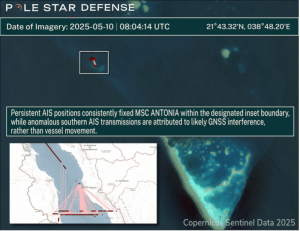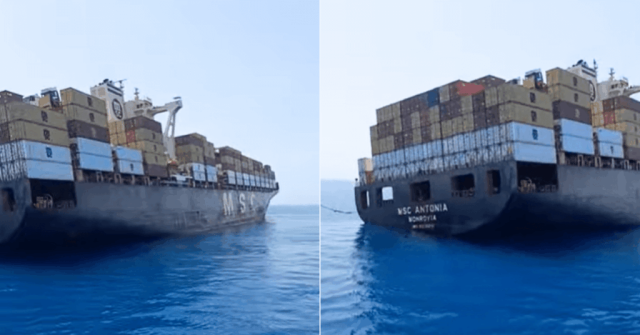Shipping Desk:
Amid rising concerns over navigational safety, maritime experts suspect that container ship MSC Antonia, which ran aground near the Eliza Shoals south of Jeddah Port in the Red Sea, was the victim of deliberate GNSS (Global Navigation Satellite System) spoofing. The incident has reignited global discussions about electronic interference in busy sea lanes.
Analysis of the ship’s AIS (Automatic Identification System) and tracking data revealed irregularities in its route prior to the grounding. Leading maritime intelligence firms including Windward, MarineTraffic, and Pole Star Global indicate that the event may have been caused by GNSS spoofing or signal jamming.
Windward’s analytics showed deviations in the ship’s track consistent with spoofing activity. Pole Star Global confirmed that the vessel’s navigational systems received falsified satellite signals, feeding incorrect location data into its ECDIS (Electronic Chart Display and Information System). As a result, the crew remained unaware that the vessel was off course.
Windward’s Q1 2025 maritime risk report noted a surge in spoofing events in the Red Sea and the Gulf of Aden. In some cases, vessels experienced location shifts of up to 6,300 kilometers—well beyond normal GPS errors.
 The MSC Antonia incident underscores the vulnerability of modern, tech-reliant vessels to navigation threats. Experts are urging the shipping industry to adopt layered navigational strategies—combining radar, inertial navigation, and visual bearings—especially in high-risk waters.
The MSC Antonia incident underscores the vulnerability of modern, tech-reliant vessels to navigation threats. Experts are urging the shipping industry to adopt layered navigational strategies—combining radar, inertial navigation, and visual bearings—especially in high-risk waters.
While the exact source of the spoofing remains unidentified, analysts warn that such electronic interference poses a serious cyber and electronic security threat to maritime routes worldwide.
Although MSC has not officially confirmed the GNSS spoofing claim, multiple independent analyses suggest that electronic interference was a key factor in the grounding. The case has amplified calls for robust defense mechanisms and multi-layer verification in vessel positioning systems.
MSC Antonia, operated by MSC under the Liberian flag, was en route from Sudan’s Port of Marsa Bashayer to Saudi Arabia’s Jeddah port when it suddenly veered off course and became stranded in shallow waters. No injuries were reported, but the vessel remains grounded, and salvage efforts involving tugboats are currently underway.
Captain Steve Baumgartner, Vice President at Pole Star Global and a noted maritime security expert, confirmed that the vessel’s automatic positioning systems had received manipulated data. He explained that spoofing involves sending fake satellite signals, which mislead navigation systems into displaying incorrect positions, leaving the crew unaware of their actual location.
The Pole Star Global findings align with earlier Windward reports, which revealed that the frequency and severity of GPS disruptions in the Red Sea region had spiked dramatically in early 2025. In contrast to Q4 2024, when vessel location anomalies reached up to 600 kilometers, Q1 2025 saw displacements of as much as 6,300 kilometers.
On May 9, the UKMTO (United Kingdom Maritime Trade Operations) also reported multiple GPS disruption incidents affecting ships in the Red Sea. Taken together, these findings suggest the MSC Antonia grounding was not an isolated case, but rather part of a broader pattern of electronic warfare at sea.
Captain Baumgartner commented, “Though the event may not seem complex, its implications are severe. We had anticipated something like this was bound to happen sooner or later.” He expressed relief that all crew members were safe.
He further stressed the importance of enhancing maritime awareness and preparedness against electronic threats. “The industry must not rely solely on GPS. We need alternative navigation technologies and improved crew training,” he emphasized.











